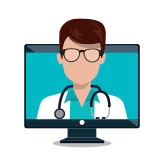Most people experience some form of allergies in their lifetimes. Allergies are common and often come on throughout life. To learn more about Allergies come into WellCare Urgent Care center in Grand Rapids.
What are Allergies?
An allergy is characterized by a negative reaction of the immune system when you encounter a foreign substance such as pet dander, pollen, or certain foods. If you have an allergy the immune system creates antibodies that identify the foreign substance as harmful. This then creates a reaction such as an inflammation of the skin, digestive system, airways, or sinuses. If you have severe allergies then anaphylaxis can occur, which can be life-threatening.
Respiratory Allergies
These types of allergies are usually triggered by seasonal and pet-related allergens.
Symptoms of Respiratory Allergies:
- Rash
- Runny or Stuffy Nose
- Sneezing
- Itching of the Nose or Eyes
- Watery, Red, or Swollen Eyes
For these types of allergies, there are many various treatments available. Over-the-counter antihistamines and nasal corticosteroids are helpful in relieving the symptoms.
Food Allergies
Food allergies are very common but the types of food that cause the allergies to vary. These allergies occur when your immune system identifies a food as harmful. Many food allergies are well-managed, but they can progress into a serious, life-threatening condition. If you or someone around you is experiencing a negative reaction or anaphylaxis, then contact 911 immediately.
Symptoms of Food Allergies:
- Swelling of the Face, Throat, Tongue, or Lips
- Hives
- Tingling of the Mouth
- Anaphylaxis
It is important to be aware of your food allergies and to avoid eating these foods. You should also carry some epinephrine on you that has been prescribed by your doctor in case of a serious reaction.
Frequently Asked Questions about Allergies
What's the difference between allergies and a cold?
Though some of the symptoms look similar, there are a few key factors that separate the common cold from allergies. The most apparent difference is the length of the symptoms-- colds usually last two weeks at the longest, whereas allergies will persist as long as the allergen is present. Additionally, there is not a clear trigger with a cold in the same way as there is with allergies like pets or pollen.
Are my allergies making me nauseous?
Though it is not commonly labeled an allergy symptom, it is possible to experience nausea with allergy flare-ups. After prolonged exposure to an allergen, your body may have produced excess mucus buildup. As your body attempts to clear away this substance, mucus will begin to drain away as post-nasal drip. As it drains down your throat, mucus will begin to build in the stomach, inducing nausea and sometimes vomiting. Call WellCare Urgent Care if this symptom arises.
Why have my allergy medications stopped working?
If you notice your symptoms getting worse even after taking antihistamines, there could be a few reasons why. One of the simpler causes is that you're taking the medication too lateu2014 antihistamines should be taken prior to allergen exposure, or they will not be effective. Other reasons could include your allergies worsening, or your immune system being suppressed with age.
Can you outgrow allergies?
It is common for children to outgrow various food allergies as they get older. In over half the cases reported, children with allergies to milk or eggs outgrow it by their teenage years. However, outgrowing allergies is not a certainty and should be approached carefully. The safest way to test if you have outgrown an allergen is with a doctor's allergen test. Keep your allergy medication stocked even after outgrowing your allergies as they can come back occasionally.
What happens if I don't take care of my allergies?
Untreated allergies are not only a nuisance but can lead to serious complications. If left untreated, you could develop new allergies and severe allergy attacks. When you experience an allergy attack, your immune system is exerting its energy fighting off a perceived threat, and frequent allergy flare-ups weaken the immune system. Over time, this can manifest as infections building in the body.
Can allergies develop later in life?
It is possible to develop allergies at any age, even if you have never had them before. Environmental changes, new exposures, or immune system shifts can trigger allergies in adulthood. If you suspect new allergies, allergy testing can help identify the cause.
How can I tell if I have seasonal allergies or year-round allergies?
Seasonal allergies occur at specific times of the year due to pollen from trees, grass, or weeds, while year-round allergies (perennial allergies) are triggered by indoor allergens like pet dander, dust mites, or mold. If your symptoms persist throughout the year, you may have perennial allergies and should seek medical advice for long-term management.
What are the most common food allergens?
The most common food allergens include milk, eggs, peanuts, tree nuts, soy, wheat, fish, and shellfish. Reactions can range from mild itching and swelling to severe anaphylaxis. If you experience symptoms after eating certain foods, it is important to seek medical guidance and avoid potential allergens.
Can allergies cause breathing problems?
Allergies can cause respiratory symptoms such as wheezing, shortness of breath, and chest tightness, especially in individuals with asthma. Severe allergic reactions, such as anaphylaxis, can lead to difficulty breathing and require immediate emergency care. If you have persistent breathing issues related to allergies, medical treatment can help manage symptoms.
How can I reduce allergy symptoms at home?
To reduce allergy symptoms at home, use air purifiers, wash bedding frequently, keep windows closed during high pollen seasons, and avoid known triggers. For pet allergies, regular pet grooming and cleaning can help minimize allergens. If over-the-counter medications are not effective, WellCare Urgent Care can provide additional treatment options.
Come into WellCare
If you are having trouble breathing or experiencing other respiratory problems, it is important that you seek emergency care and call 911. If you would like to get control of other allergy symptoms and learn to manage them then come into WellCare Urgent Care center in Grand Rapids to get examined by a medical professional. We accept walk-ins at our Cascade and Leonard locations, or you can schedule a same-day appointment through our online portal.




